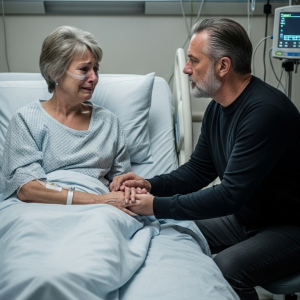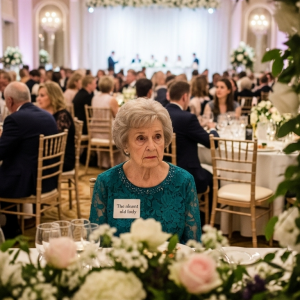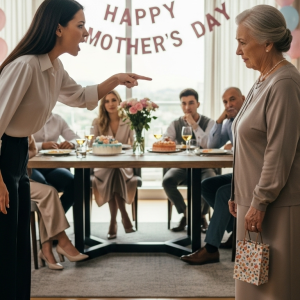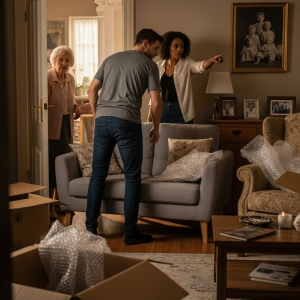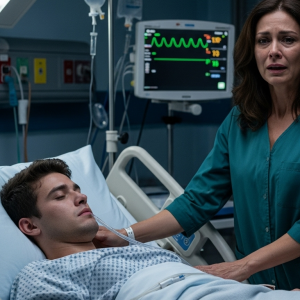The words echoed in the sterile conference room long after she’d said them. “You’re not family. You only stayed because it was convenient.” My daughter, Indie, delivered the line while signing the last of the inheritance papers. My son-in-law, Lance, remained silent.
I just signed my own name and left without a word. Three weeks later, she would find out what I had truly signed.
The day had begun with rain tapping against my windshield as I pulled into the law office. My arthritic hands gripped the steering wheel, a mix of pain and the anxiety that gnawed at my stomach. Indie’s tone on the phone had left no room for questions. “Just be there at 3, Mom. Don’t be late.”
At sixty-five, I thought I was past the stage of feeling like a scolded child. Apparently not. The receptionist pointed me to a conference room without looking up. Each step down the long hallway felt heavy, carrying the weight of a finality I’d sensed for months.
They were both there, Indie in a crisp navy suit, Lance beside her, his attention fixed on a stack of papers. Neither stood when I entered.
“You’re five minutes late,” Indie said, her eyes glued to her phone.
“I’m sorry, the rain…”
“It’s fine. Just sit.”
I settled into the hard-backed chair, placing my worn purse on my lap. The only sound was the rustle of papers as Lance arranged them in front of me. “These are the final distribution papers for Dad’s estate,” Indie explained, her voice clinical. “This is just a formality to transfer the remaining assets.”
After losing my husband, Harold, four years ago, I’d moved in with them to help with their son, Mason. What began as a grandmother’s love—making breakfast, school pickups, bedtime stories—had slowly morphed into the role of unpaid, live-in help. Convenient, but not quite family.
Lance slid the papers toward me. “Sign where the tabs are,” he said, his voice flat. It was the most he’d spoken to me in weeks. As I reached for the pen, my hand trembled slightly.
“What exactly am I signing away?” I asked, my voice softer than I’d intended.
Indie sighed, an exasperated sound I knew all too well. “Mom, it’s just the formalities. Everything Dad left for us. The house, the accounts, his investments. We’ve been over this.”
We hadn’t been over anything. Since Harold’s death, financial discussions happened behind closed doors, without me. But I nodded and began to sign.
“I’m glad this is finally settled,” Lance said to Indie, as if I weren’t in the room. “We can move forward with the renovations next month.”
I paused, pen hovering over a signature line. “Renovations? To my house? The home Harold and I built together?”
Indie’s eyes met mine, cold and unfamiliar. “We’re gutting the old place. It’s outdated, and we need the space for entertaining.”
“But that’s… my home,” I whispered.
“It’s just a house, Mom. And technically, it’s our house now.”
The air left my lungs. Indie leaned forward, her manicured hands flat on the table. “Let me make this clear. We’re done playing house. You were useful when Mason was younger, but he’s in school full-time now.”
“I thought…”
“You thought what? That you’d live with us forever?” she scoffed. “It’s time for you to find your own place.”
My pen clattered onto the table. “Where will I go?”
For the first time, Lance looked uncomfortable, but Indie’s expression was unyielding. “There’s a nice retirement community in Brentwood. We’ve already looked into it for you.”
The words were physical blows. A retirement home. They had been planning this all along—the hushed conversations, the questions about which furniture I wanted to keep. It was all a lie.
A strange, cold calm settled over me. I picked up the pen and added my final signature. Indie gathered the papers without a word of thanks.
“Is that all?” I asked, rising slowly.
“That’s all,” Lance confirmed, still refusing to meet my eyes. I clutched my purse and turned to leave, but Indie’s voice stopped me at the door.
“Mom. Don’t make this harder than it needs to be. You’re not family. You just stayed because it was convenient for all of us.”
I didn’t turn back. I simply walked out, my footsteps echoing down the hall. As I stepped back into the rain, I was just an old woman with a broken heart and nowhere to call home.
My small motel room felt both claustrophobic and achingly empty. I placed Harold’s photograph on the nightstand, my fingers lingering on his smiling face. “You’d be so disappointed,” I whispered.
Sleep wouldn’t come. Memories flooded in, not as gentle waves, but as a crushing tsunami. Indie as a little girl, Harold’s pride at her wedding, and his last days in the hospital. “Promise me you’ll take care of each other,” he had whispered, holding both our hands. A promise I had kept; a promise she had discarded.
I had sold my condo to help them, believing my family needed me. The first year with Mason was a blur of joy. But slowly, I was erased. My role shifted from mother to nanny, from family to staff. At a Christmas party, I overheard Indie introduce me to a colleague: “This is Rhonda. She helps us with Mason.” Not “my mother.” The words had stung then; now they felt like a death sentence.
The next morning, my phone rang. It was Indie. My heart leaped with a foolish hope that she was calling to apologize.
“Mom. Where are you?” Her tone was pure business.
“The Gateway Motel on Lexington.”
“A motel? Good grief,” she sighed. “Listen, I need Mason’s vaccination records for camp. Where did you put them?”
Not, how are you? Not, are you okay? Just another demand. “Filing cabinet in the study. Third drawer, blue folder.”
“Great, thanks.” She paused. “So, have you thought about Brentwood Acres? They have an opening next month.”
“I don’t think Brentwood is for me,” I said, surprising myself with the firmness in my voice.
“Fine, but you need to figure something out. Lance’s mother wants to use the guest room when she visits next month.” She hung up before I could respond.
I stared at the phone. For years, I had made excuses for her—she was stressed, she was ambitious. But the truth was simpler and more painful. She simply didn’t value me. My eyes fell on my purse, where a copy of yesterday’s paperwork lay. The documents I had signed so obediently, the papers I had subtly altered with a single checked box before signing.
It was a small act of self-preservation that Indie and Lance, in their arrogant rush, had completely missed.
Martin Goldstein’s office smelled of old books and coffee. He had been Harold’s best friend and our lawyer for forty years. His eyebrows rose as he reviewed the documents.
“Rhonda, you checked box 14-C,” he said, looking at me over his reading glasses. “Did you understand what you were doing?”
I nodded. “I did. And they didn’t notice. They didn’t even look.”
A small smile played at the corners of Martin’s mouth. “Harold would have appreciated the irony. He always admired quiet strength.” Martin tapped a separate folder. “Four years ago, just after his diagnosis, Harold came to see me. He wanted to protect you, to ensure you’d always have a place that was yours alone.”
The Cape Cod house. Our little sanctuary by the sea, a weathered cottage we’d bought thirty years ago and slowly turned into our personal paradise.
“The property has tripled in value,” Martin continued. “A conservative estimate puts it at about 2.8 million now. Plus, Harold made some smart investments with the rental income. There’s a sizable account attached to it.”
I gasped. For years, they had treated me as if I were financially dependent on them.
“When will they find out?” I asked.
“Three weeks, give or take. When the estate finalization goes through, they’ll realize the Cape Cod property wasn’t included.” He paused. “Rhonda, they are going to be angry.”
I smiled sadly. “They’re already angry, Martin. They just don’t know why yet.”
Later that week, in the quiet of the guest house Martin insisted I use, I found a leather-bound journal Harold had given me on his last Christmas. I’d never opened it, too afraid of the grief. Now, I needed his wisdom.
The first entry, dated shortly after his diagnosis, took my breath away.
September 15, 2019. Rhonda doesn’t know I’ve seen through Indie’s plan. Our daughter thinks I don’t notice how she’s already rearranging our lives, making decisions about Rhonda’s future. I spoke with Martin today about protecting Rhonda. The Cape Cod house will be her security, her escape. I hope I’m wrong about our daughter, but I’ve seen the coldness in her eyes when she thinks no one’s looking.
I closed the journal, tears streaming down my face. Harold had known. He had seen what I couldn’t bear to acknowledge. Page after page revealed his quiet battle to secure my future, his growing concern over Indie’s character.
His final entry was written just days before he died.
April 28, 2020. Everything is in place for Rhonda. My greatest regret is leaving her to face what’s coming alone. But she is stronger than she knows. Rhonda, if you’re reading this, remember you were always enough. Don’t let them convince you otherwise.
I clutched the journal to my chest. For the first time since that awful day, I felt something other than grief. I felt ready.
Exactly three weeks later, my phone rang. It was Indie.
“What the hell did you do?” Her voice was a whip crack of ice and fire.
I set down my teacup, my hand surprisingly steady. “I believe you’ll need to be more specific.”
“The Cape Cod property! It’s not in the estate. The lawyer said you checked some box that kept it separate.”
“Box 14-C,” I said calmly.
“You deliberately tricked us!” she screamed.
“I signed the documents I was asked to sign,” I replied. “The Cape House was always mine. Harold left it to me, separate from the estate.”
A stunned silence followed. “We’re coming over,” she finally said. “Where are you?”
I gave her Martin’s address. An hour later, they stood on the porch. Indie wore her power suit, but her eyes widened slightly at my appearance. I had showered, styled my hair, and put on the navy dress Harold loved. I would not look like a victim.
“Let’s get to the point,” Indie said, ignoring the coffee and cookies I’d set out. “You withheld the property.”
“I withheld nothing,” I replied evenly. “It was never part of the estate to begin with. Your father made sure of it.”
Lance spoke for the first time. “The property is worth almost three million, Rhonda.” He had dropped the “Mom” he’d used for fifteen years. “That’s a significant asset. It should be shared.”
“Shared?” I asked, my voice dangerously quiet. “Like your home was shared with me before you decided I was an inconvenience?” He had the grace to look away.
Indie paced the small room. “You’re being petty because we asked you to move out.”
“You didn’t ask, Indie. You informed me I was being discarded. You told me I wasn’t family.”
“I was upset!”
“No, you were honest. For the first time in years.”
A sudden laugh from outside drew our attention. Through the window, I could see Mason riding his bike, with Martin pretending to chase him.
“Is that…?” Indie stood abruptly. “You’ve been seeing Mason behind our backs?”
“No. It’s the first time I’ve seen him since I left.”
She moved to the window, watching her son. For a moment, her expression softened. “He’s been asking about you,” she admitted reluctantly. “Wants to know when Grandma’s coming home.”
The words pierced my heart. “What did you tell him?”
“That you needed some time to yourself,” she said, turning back to me. “What was I supposed to say? That we kicked you out?”
I stood, signaling the end of the conversation. “The Cape House is non-negotiable. It’s my home now, just as Harold intended.” I opened the door. “I have loved you and supported you for fifteen years. When you decided I was disposable, I left without a fight. But I will not be bullied out of the one thing your father left to protect me.”
As they stepped onto the porch, Indie paused. “This isn’t what Dad would have wanted.”
I smiled sadly. “Actually, Indie, it’s exactly what he wanted. He knew me better than anyone. And he knew you, too.”
Two weeks later, I was arranging wildflowers in my new home when the phone rang. It was Lance.
“I’m in town,” he said, his voice hesitant. “Could we talk?”
We met at a quiet coffee shop on Main Street. He looked tired, the polished corporate facade cracked and worn.
“I’m here because I need to apologize,” he said, twisting his wedding ring. “Indie doesn’t know I’m here. I stood by while she treated you like you were disposable, and I know it was wrong.”
“Why did you let it happen, Lance?” I asked.
He looked out the window. “At first, it was easier. Then it became a habit. After a while… I think I was afraid of her. She’s not the person I married.”
He told me Mason cried for me every night. He asked if he could bring him to visit, without Indie knowing. My heart ached for my grandson, and I agreed immediately.
Then Lance leaned forward, his voice low. “There’s something else. Indie has been in talks with developers for over a year to sell your old house—the one you and Harold built. The entire block is being rezoned. That’s why she was so eager to get you out.”
The betrayal was staggering. She had been planning this even before Harold died.
“I’m sorry,” Lance said quietly. “Last week, Mason found the family photo albums in the trash. Indie had thrown them away. She said we needed to ‘declutter’ before the move.”
I closed my eyes, imagining my grandson’s confusion. When I opened them, Lance was watching me with a new respect. “Harold would be proud of you,” he said.
That Saturday, Mason arrived. He ran into my arms, a tiny hurricane of love and missed time. We flew kites, collected shells, and ate chocolate chip cookies. It was a perfect day. As they prepared to leave, Lance looked at me, his expression troubled.
“Rhonda… I’m thinking about leaving Indie. I’ve been consulting a lawyer about custody. When the time comes, I may need your testimony.”
I watched them drive away, Mason’s face pressed against the window, waving until he was out of sight. I stood on the porch, contemplating forgiveness, family, and the strange, winding paths our lives take.
Three months later, on a crisp December morning, my doorbell rang. It was Lance and Mason. But their car was packed with suitcases and boxes.
“We left,” Lance said simply. “For good.”
Mason grinned beside him. “We need a place to stay. I suggested we ask if you know of any nice neighborhoods.”
Understanding dawned. This wasn’t just a visit; it was a new chapter. I looked at my grandson’s hopeful face, and then at the house Harold had left me. It wasn’t just my sanctuary anymore. It was becoming what it was always meant to be: a home.
“I might know just the place,” I said, opening the door wider to welcome them in.
